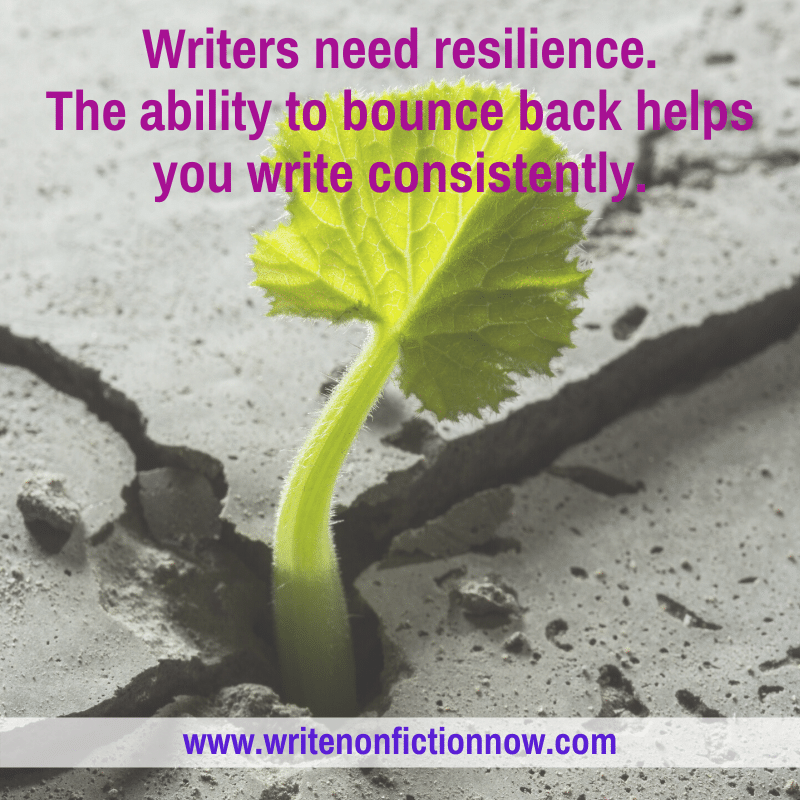The COVID-19 pandemic forced you to stay home indefinitely, and sheltering-in-place meant writing without your typical daily structure or accountability. Extra time at home, coupled with a barrage of pandemic-related news, may also have caused you to get lost in your head, making it hard to focus on your writing project. But if you intend to take advantage of this period to write, submit, and, perhaps, even publish, you have to develop resilience.
The ability to bounce back can positively impact your productivity and increase your mental well-being, especially during tough times. Resilience—the capacity to recover quickly from difficulties and turn your mind and actions to the task at hand even when life feels chaotic or overwhelming—helps you write consistently…no matter what.
There’s no magic formula for building resilience. But if you are finding it challenging to write or pursue publishing right now, one or all of the following strategies might help. The more resilient you become, the more consistently productive you will be as a writer. That means you’ll always make strides toward your goals.
#1. Keep Going Despite Rejection
In a COVID-19 era, when people often feel overwhelmed and trapped at home, you may take rejection more personally than in the past. Of course, rejection for a writer is tough (but harder when you find yourself in a pandemic) and requires resilience.
With my first memoir, I submitted what I thought was a killer draft to a developmental editor. When she sent it back, I discover that she had deleted vast chunks of my story, citing that the scenes did not move the story along. These were some of my favorite scenes, and I felt as if she had “killed my darlings.” I perceived her edits as a reflection of my writing ability. To internalize the lessons of this “rejection,” I put the manuscript away, and only months later, explored new ways of improving my storytelling with fresh eyes.
Resilient writers realize that rejection is just another opportunity to trust your own voice. This is your superpower! Sometimes, rejection has more to do with the publisher’s needs than the quality of your own writing. Perhaps the topic is not a good match.
Even if rejection makes you want to take a break from your work in process, continue writing. Maybe try working on another project until you’re ready to tackle the original piece. Or, be brave, and pick up the original manuscript and begin revising.
#2. Turn Obstacles into Opportunities
Time at home during the global pandemic has resulted in people turning inward. In the process, writers, specifically, are discovering things about themselves and turning to writing as a way to process those insights. Their resilience shows up in their willingness and courage to turn their obstacles into opportunities to write books, essays, articles, and blog posts that impact others.
 For years, I journaled as a way to sort out my feelings and reactions to life events. That internal process resulted in uncovering my book idea. I then started writing in earnest and discovered memoir writing as the best venue to tell my story.
For years, I journaled as a way to sort out my feelings and reactions to life events. That internal process resulted in uncovering my book idea. I then started writing in earnest and discovered memoir writing as the best venue to tell my story.
At that point, I began taking courses and attending conferences to improve my memoir writing craft. I felt like I was in grad school, but that the experience led me to publish two memoirs, Ever Faithful to His Lead: My Journey Away From Emotional Abuse and Just the Way He Walked: A Mother’s Story of Healing and Hope.
Now may be a better time than ever in human history to explore your ideas and claim your voice. Resilient writers take advantage of their obstacles to create opportunities to write about themselves and tie their obstacles to significant issues.
And they seek out ways to improve their writing, so their message is more easily understood. This includes online courses, coaches, and virtual events.
#3. Remember Your Big Why
Writing nonfiction is a self-discovery process. As you unearth events and feelings long tucked away inside your psyche, be gentle with yourself. And pay attention, because one of those memories or emotions may uncover your BIG WHY.
When the thought of publishing my intimate and vulnerable stories threatened to overwhelm me, one day I asked myself, “Why am I putting myself through such a daunting process?”
Actually, I needed to ask myself a simpler question: “Why am I writing this book?”
I realized I was writing my book to share my universal personal message of hope. I wanted to share my story so readers would learn what I had learned: No matter how far down the abyss you go, there’s always hope.
On the days when writing feels difficult, keep asking yourself, “Why?” Discover your Big Why—your purpose or mission. Why do you continue writing? What presses you to keep going no matter what? Remembering the reason you write will keep you bouncing back and, therefore, writing.
#4. Stay Focused Despite Your Inner Critics
All writers have inner critics—those negative voices that tell you that your writing isn’t good enough, you have nothing to say, or your book will never sell. These voices might sound like a parent or a former teacher. You might have one inner critic or many. Resilient writers, however, know how to continue writing despite the voices in their heads.
Indeed, writers are tougher on themselves than others. And that critical mental chatter can stop you in your tracks. To continue writing despite your self-criticism, learn how to use the inner critics to motivate you to write.
Here’s a strategy to help you stay engaged: Name your inner critics, so you can deal with the voices more effectively. I named my inner critic “Gertie,” and I even went as far as to dialogue with her when I felt stuck in my writing. Somehow, putting her words on paper helped loosen her grip on me.
Articulate those critical voices to gain objectivity and stay positive. In the process, you will quiet the mental chatter, so you can write. If that doesn’t work for you, get creative! (Resilient writers are creative problem solvers!) For instance, consider lining up stuffed animals to have a positive conversation with your inner critic. Resilient writers are resourceful in finding solutions, so they keep writing even when they’re experiencing doubts.
Develop resilience, so you keep moving toward your writing goals even during tough times, like the COVID-19 pandemic. When you focus your energies in a positive direction, you increase the chances of seeing your work-in-progress to completion.
How do you develop resilience? Tell me in a comment below. And if you know someone who would find this post helpful, please, share it!
About the Author
 Kathleen Pooler, the creator of the blog, A Memoir Writer’s Journey, uses hope, faith, and writing to transform, heal, and transcend life’s obstacles and disappointments. Just the Way He Walked is Pooler’s second memoir about overcoming alcoholic-enabling actions. Her debut memoir addresses one woman’s life lessons, from family abuse towards her journey of empowerment. To contact Kathleen Pooler or learn more about her books, visit her website at krpooler.com.
Kathleen Pooler, the creator of the blog, A Memoir Writer’s Journey, uses hope, faith, and writing to transform, heal, and transcend life’s obstacles and disappointments. Just the Way He Walked is Pooler’s second memoir about overcoming alcoholic-enabling actions. Her debut memoir addresses one woman’s life lessons, from family abuse towards her journey of empowerment. To contact Kathleen Pooler or learn more about her books, visit her website at krpooler.com.
 Would you like to learn more about becoming a nonfiction author? If you aren’t sure how to get started or to move forward on your nonfiction writing journey, check out the Nonfiction Writers’ University MASTERS program. Learn all the steps to becoming a successful—and profitable—author. Discover how (finally) to write consistently, boldly, enthusiastically, and productively. Develop the mindsets, strategies, habits of the world’s most successful writers. Make your difference today. Click here to learn more. (And if you aren’t ready for the Nonfiction Writers’ University Masters program, explore the Nonfiction Writers’ University. You can enjoy a 30-day trial membership for only $1.)
Would you like to learn more about becoming a nonfiction author? If you aren’t sure how to get started or to move forward on your nonfiction writing journey, check out the Nonfiction Writers’ University MASTERS program. Learn all the steps to becoming a successful—and profitable—author. Discover how (finally) to write consistently, boldly, enthusiastically, and productively. Develop the mindsets, strategies, habits of the world’s most successful writers. Make your difference today. Click here to learn more. (And if you aren’t ready for the Nonfiction Writers’ University Masters program, explore the Nonfiction Writers’ University. You can enjoy a 30-day trial membership for only $1.)
Kathleen Pooler says
It’s an honor to be your guest, Nina. Thank you for the opportunity. It certainly has been a challenging time for all of us writers. I’d love to hear how others are faring during this uncertain, unprecedented time. It’s so important we share our stories now more than ever.
Marian Beaman says
Kathy, you and I have both lived through the thick and thin of writing memoir. If you aren’t resilient, nobody is!
I shared this on Facebook. Thank you, Nina, for featuring my dear friend Kathy today.